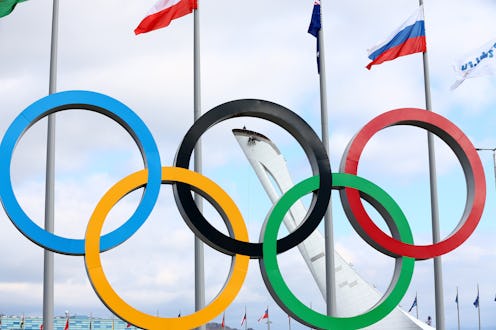News
Sochi LGBT Controversy Gets More Personal
Finnish swimmer Ari-Pekka Liukkonen just came out in an interview with YLE, making him the first active gay Finnish Olympian. While his coming out story is touching, it would not be as well-covered by American outlets like The Advocate if the Sochi Olympics were not a hotbed of terrible LGBT laws and a disregard for Olympic equality policies. So, by way of Mr. Liukkonen's coming out story, here are all the things you need to know about the controversy, the games, and the LGBTQ (and allied) Olympians who have spoken out.
Mr. Liukkonen told YLE that he chose this week to come out because he "wanted to start a broader discussion in connection with Sochi, because it’s sad that the legislation in Russia restricts the human rights of young people and others." While this is a touching reason for coming out, it also reflects a middle ground in the ever-heightening reaction to Russia's anti-LGBTQ laws. In case you haven't been following the outrage, it began with a law Putin signed this past June, banning any "nontraditional" (read: non-straight) sexual relationships between minors, or exposing these relationships to minors.
The world was supposed to be "reassured" when the mayor of Sochi stated that the law only prevented LGBTQ folks from "imposing their habits on others," since, you know, straight people are notoriously fragile. Obviously, that statement backfired from the picture of "tolerance" the mayor was trying to paint. After the implications on gay families, gay teenagers, and LGBTQ awareness were fully discussed, many called for the US to boycott the Games (and the hashtag #dumprussianvodka was spawned in the spirit of revenge).
President Obama urged Russia to be tolerant and kept us in the Games after many terrible Putin soundbites and an assertion by the mayor of Sochi that there are no LGBTQ people in his town. Since then, the Olympic media coverage has become a luge of condemnations of Putin and his laws, sending anti-Russian sentiment down the pipe as fast as possible.
Sadly, all of the shots fired on Twitter have not spawned the international "broader discussion" Mr. Liukkonen desires. American opinion-hawkers like myself have showed their disdain for Russia's laws again and again, and many have compared the state of LGBT rights around the world with colorful maps, but few have tried to discuss Russian opinions with Russian authorities, which, as Mr. Liukkonen's quote suggests, would be one of the only agents of change for the "young people" in Russia.
One notable exception is Ian McKellan's letter to Putin, in which he, along with 27 Nobel laureates, personally begs Putin to repeal the anti-gay laws. Sadly this "open letter" has done more to show Sir Ian's resolve than to convince Putin to empathize with his gay citizens. Even President Obama's strong decision to choose three out ambassadors for our Olympic delegation has not sparked discussion, since the US Olympic committee refuses to take a stand on the issue. Without a united front, we cannot approach an LGBTQ rights talk with Putin or any other country, and it makes me question the amount of progress some Americans have made in our own discussions.
Later in Mr. Liukkonen's interview, he seemed to take the media hailstorm head-on, saying that "In the future I would hope that elite athletes and other people will not find homosexuality to be any kind of news." While he is clearly making a point about what Americans would call being "born this way" (he later compares being gay to being left-handed), this point is also a great reminder about the experiences of LGBTQ Olympians. With all of the tinder that has been laid by the media already, it seems like American (and international) LGBTQ Olympians and their allies will be under a microscope: if they can't balance staying safe in a hostile environment and "representing" their community, the flames of Internet opinion will engulf any coverage of their sport.
Some athletes have already recognized the political focus of Sochi coverage, and have embraced it. Caitlin Cahow, of the women's ice hockey team, has stated that she knows her sexuality was a central part of her nomination to the Olympic delegation, and she believes that Olympic sport and international policy will always be linked. And of course, she's right: any event that brings nations together in one place will bring up any outstanding human rights arguments between them. And of course, initiatives like Principle 6, which calls out the International Olympic Committee for going back on their so-call "equality" policies, are important whistle-blowing advocacy groups.
But with all the pressure of advocacy, we have to remember that human rights affect individual humans, and that is a thread throughout Mr. Liukkonen's coming-out story — the idea that sexuality is one facet of his identity, and now that he's out, he can show all sides of himself. Perhaps we should create a media environment that encourages our athletes to be themselves as well, without making a circus out of their personal lives... unless they roll out the big tent themselves.
As we watch the opening ceremonies later this week and hope that none of the violent threats are true, let's also remember that the personal is political in Sochi, but the political is also personal. Mr. Liukkonen has reminded the cacophony of Internet voices that condemning discriminatory policies is important, but supporting the individuals they affect deserves an equal amount of time.
